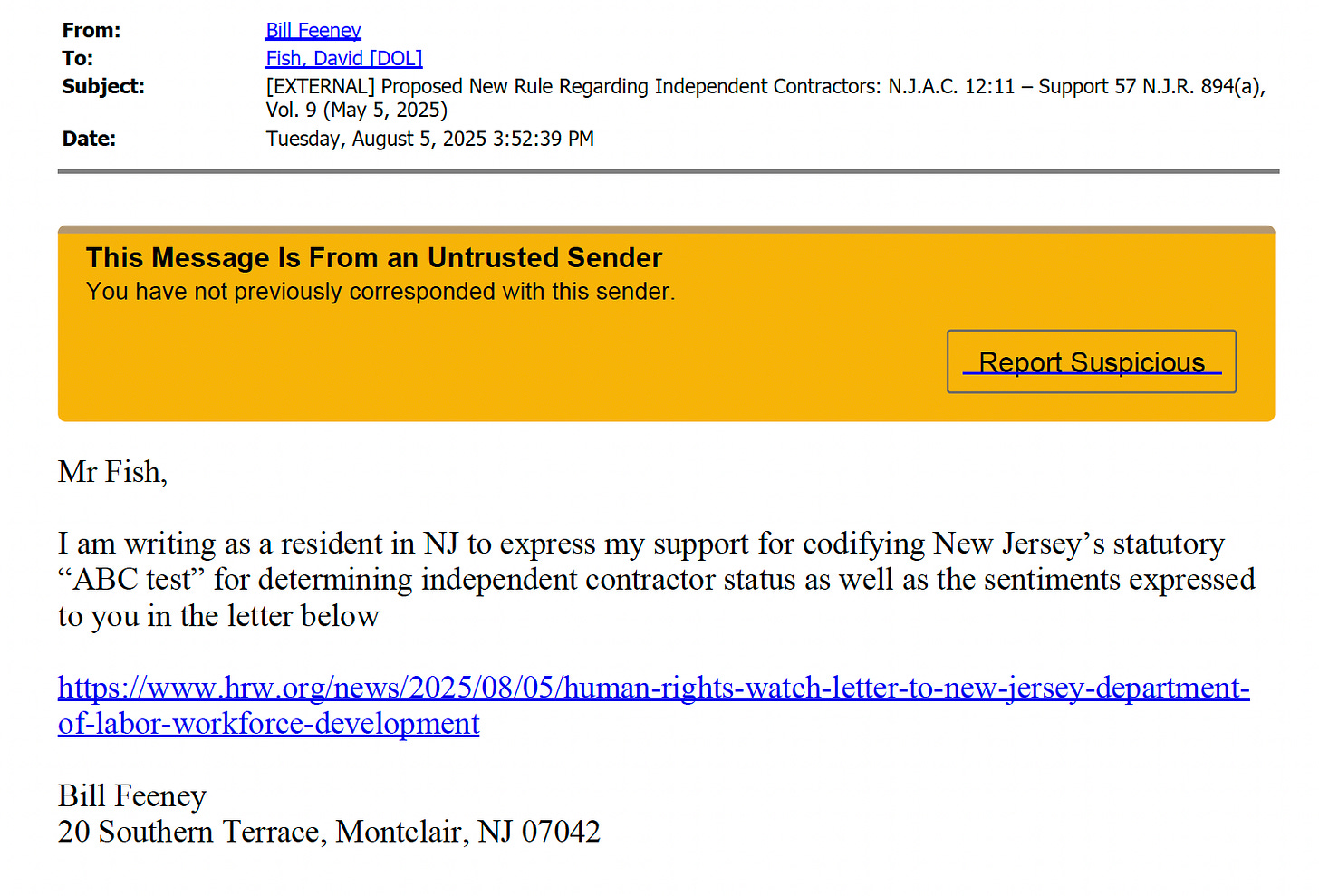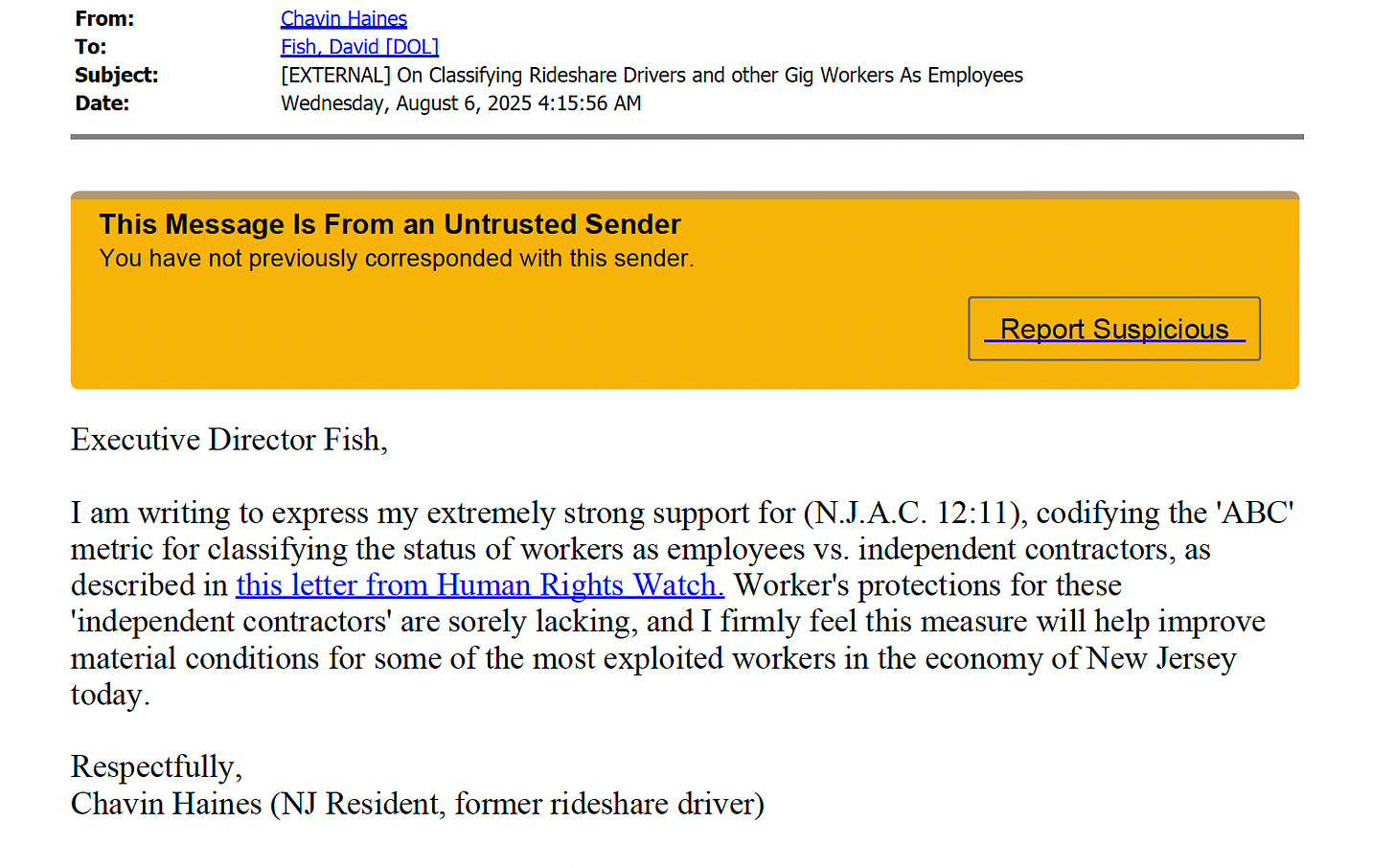Yes, This Comment Counts
The Public Justice Center urges New Jersey to proceed with its independent-contractor rule because of five people the nonprofit met in Maryland.
A solid 99% of the estimated 9,500 public comments filed with the New Jersey Department of Labor & Workforce Development are against the currently proposed independent-contractor rule-making.
I’ve gone through these public comments numerous times, as have other people looking by hand and with AI searches. All told, I’m aware of 26 written public comments that support the proposal.
So far, I’ve written about the claims in 13 of these 26 supportive comments:
The National Employment Law Project, a union-affiliated, multimillion-dollar nonprofit based in New York City that cited data as old as 1984
The Economic Policy Institute, a multimillion-dollar nonprofit based in Washington, D.C., whose chairwoman is the head of the AFL-CIO, and whose research is riddled with the union-backed think tank’s estimates
The racial-justice think tank Dēmos, a multimillion-dollar nonprofit based in New York City that argued New Jersey should restrict independent contractors because of an illegal immigration problem near the Mexico border in Texas
The New Jersey AFL-CIO, whose comment was unable to distinguish the difference between being your own boss who works whenever you want, and having multiple part-time jobs and bosses
Five unions—Amalgamated Transit, Painters & Allied Trades, the Engineers Labor-Employer Cooperative representing Operating Engineers Local 825, United Food & Commercial Workers International, and the Teamsters—that made sweeping claims with little or no evidence to back them up
The Workplace Justice Lab at Rutgers University, whose two public comments each conflated research about minimum-wage violations and worker misclassification, and whose own research appears to contradict several claims in its public comment
New Jersey Association for Justice, a professional organization of attorneys, paralegals, law students and advocates that argued this rule-making is needed, in part, because of the way the mob infiltrated the Teamsters union about a half century ago
Human Rights Watch, a multimillion-dollar nonprofit based in New York City that cited a study that averaged just seven people per state, and none of them in New Jersey
We can add to those 13 public comments two additional comments that individuals filed, saying they wanted to associate themselves with the comment listed above from Human Rights Watch.
Here are those two public comments, in their entirety:
So that’s the substance (or, arguably, the lack of substance) that underpins 15 of the 26 public comments filed—more than half of them—in support of New Jersey’s proposed independent-contractor rule.
Today, let’s take a look at the public comment that the Public Justice Center filed in support of what New Jersey’s Labor Department is proposing to do.
This public comment, as evidence of why New Jersey should proceed with its rule-making, gives examples of things that the Public Justice Center alleges happened to five people in the State of Maryland.
Yes, Five People
The Public Justice Center is a multimillion-dollar nonprofit based in Baltimore. Its legal director, Debra Gardner, signed the public comment that’s filed in New Jersey.
Gardner’s bio says she holds degrees in law, economics and French, and has been involved with cases involving wage and hour violations, and employment discrimination. She also is a graduate of the Racial Justice Institute of the Shriver Center on Poverty Law, and of Baltimore Racial Justice Action’s Workshop for White People. In 2022, she became a founding board member of Baltimore Action Legal Team, which supports the Movement for Black Lives in Baltimore.
According to the Public Justice Center’s 2024 annual report, the organization’s many partners include 1199SEIU, the Maryland State and D.C. AFL-CIO, the Mid-Atlantic Regional Council of Carpenters, the National Employment Law Project, SEIU 328J and Unite Here! Local 7.
The Public Justice Center’s comment in New Jersey includes no research citations. There’s only one footnote, listing court cases to substantiate a sentence that says New Jersey’s highest court has handed down rulings about the ABC Test that’s used to determine independent-contractor status.
Those are court rulings whose existence, to the best of my knowledge, nobody is disputing.
As a key reason for filing this public comment, the Public Justice Center states on the first page that in Maryland, construction and landscaping workers are covered by the ABC Test. The comment states:
“If Maryland had the ABC Test for all industries, workers would have an easier claim to their unpaid wages and a stronger path to crucial workplace protections.”
Now, just to be clear: New Jersey’s proposed interpretation of the ABC Test has nothing to do with changing the laws of Maryland.
In addition, this public comment includes no examples of anything that ever happened, or that is alleged to be happening, within the State of New Jersey.
What this public comment does include, as evidence of why New Jersey should proceed with its rule-making, are anecdotes about things that the Public Justice Center alleges happened to five people in the State of Maryland.

And four of these five people, according to the Public Justice Center’s own descriptions, were fraud victims already classified as employees.
Dial M for Maryland
The first of the five people the Public Justice Center’s comment describes as evidence of why New Jersey should proceed with its rule-making is a woman who worked at a call center in Maryland.
Here’s that part of the Public Justice Center’s comment:
“We have seen circumstances in Maryland where the employer’s control over the worker is significant, yet the employer has still misclassified its workers. For example, last year we worked with an employee of a call center. As a condition of employment, she was required to sign an agreement, that stated she was an independent contractor. But her employer, the call center, meticulously managed every detail of how and when she did her job, telling her what hours to make calls, who to call, and providing her with scripts for exactly what to say on the calls. She was paid between $2 and $5 dollars per call, depending on whether the call center considered it a ‘successful’ call. She was paid nothing at all if she spent hours placing calls that were not answered or if the recipient hung up. This is blatant misclassification of a person who should be considered an employee and entitled to all the protections of Maryland’s workers’ rights laws.”
That sounds like a bad situation, of course.
But what actually happened, according to this anecdote, is that the Public Justice Center spoke with a woman the nonprofit believes should have been treated as a misclassified employee under Maryland law.
Which may have been possible to address if a complaint were filed with regulators in the State of Maryland.
And none of which has anything to do with the State of New Jersey.

Dial F for Fraud
The other four people the Public Justice Center describes in its public comment—again, as evidence that New Jersey should proceed with its independent-contractor rule—do not appear to have been classified, or misclassified, as independent contractors at all.
As the comment describes them, these four people are “former employees” of an assisted-living facility that the Public Justice Center alleges was engaging in fraud through a payment app:
“Another example we encountered in our work last year was at an assisted living facility. We spoke with four former employees of this facility who each worked 24 hours shifts and earned $80 per shift, which comes out to less than $4 per hour. They were paid through a payment app, and their employer did not deduct payroll taxes on their behalf. They clearly did not pay overtime either. These are telltale signs that an employer is engaging in workplace fraud. These workers were not running their own business, they were showing up at the time and place dictated by their employer, performing the tasks their employer instructed that were central to their employer’s business.”
Again, this sounds like a bad situation. And yes, that bit at the end lists conditions under which the ABC Test may indicate a person is an employee.
But the Workplace Justice Center itself says these people were “former employees.” There is no indication that these people were classified, or misclassified, as independent contractors at all. This anecdote states explicitly that the Public Justice Center suspects an employer of committing fraud through a payment app, based on conversations with four former employees.
And again, this all allegedly happened in Maryland. None of this has anything to do with the State of New Jersey.
That’s 16 of 26
That’s it. Those are the only two real-world examples the Public Justice Center gives for why it supports New Jersey’s proposed independent-contractor rule.
And this public comment combined with the 15 others I listed and displayed above comprise 16 of the 26 public comments—more than 60% of them—filed in support of New Jersey’s proposed independent-contractor rule.
I urge you to consider whether you believe the arguments being made in these public comments are adequate to support New Jersey’s proposed rule-making.
Governor Phil Murphy laughed out loud on live TV when a news anchor asked him a few weeks ago about the 99% opposition to this rule-making. He said, “There’s a lot of passion on all sides of this.”
I also urge you to consider, after learning what’s actually in a lot of these public comments, whether that rings true to you either.



